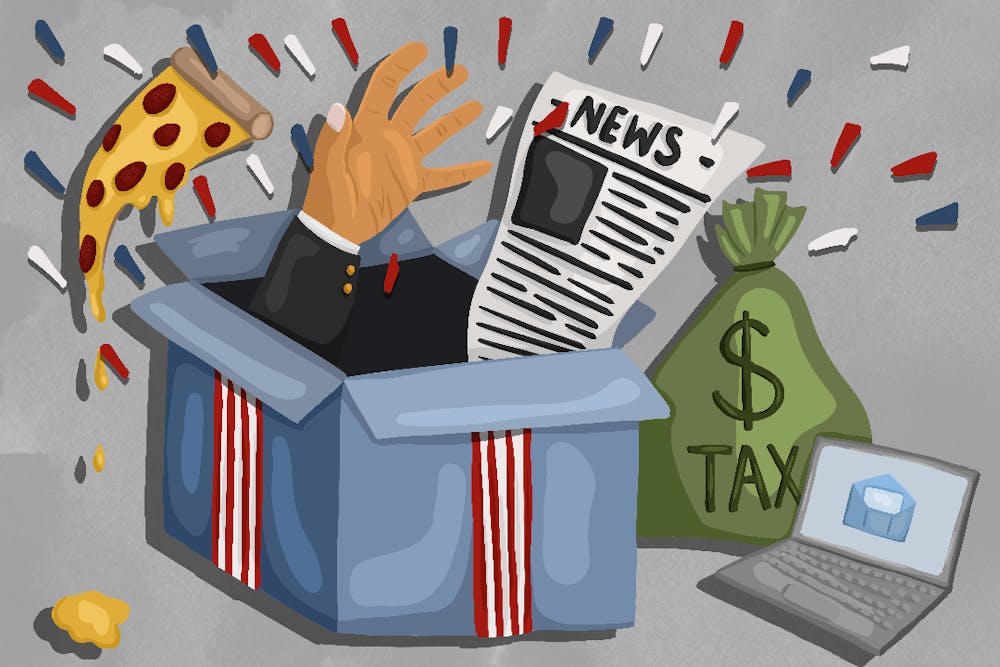With election day over a month away, there is still time for new information and revelations to come to light in what’s known as the "October surprise."
Hillary Clinton, the 2016 Democratic nominee for president, warned Vice President Kamala Harris, the current Democratic nominee for president, that "something will happen in October." Clinton shared her ominous message for Harris in a PBS interview on Sept. 27.
The term October surprise refers to the idea that every general election cycle, and sometimes midterm, there is a monumental event that can influence the upcoming election.
Dave Wells, the research director of the Grand Canyon Institute, said the October surprise is hardly ever a true surprise.
"The October surprise is usually something that does manipulate the election outcomes," Wells said. "I don't think there’s any effort by the Biden administration to manipulate things for the election, but there are two things that are happening that could definitely impact the election."
Wells said while some campaigns and administrations release information to change the election, the current headlines to watch out for are the mounting issues between Iran and Israel and the Longshoremen Strike, which was suspended as of Oct. 3.
"It could work different ways depending on how it plays out politically," Wells said. "But it's definitely a potential wild card."
While some October surprises can be predicted based on current events, others are more abstract — like the case with Clinton. During the former secretary of state's presidential run against Donald Trump in 2016, both candidates experienced a tumultuous month before the election.
"You know, in 2016, I didn't really have any idea how effective the kind of conspiracy theories and all of the attacks on me were in getting people to have just extraordinary views about me," Clinton said in a speech at the Arizona Speaker Series on Oct. 1.
Clinton said October surprises can be impactful to voting outcomes, citing one of the most famous conspiracies spread about her during the 2016 election: Pizzagate.
"(People said) 'Oh I can’t vote for her. She’s a killer, she traffics children,'" Clinton said about the now discredited claims. "Everybody says it's not true, but it lives on, and it is weaponized."
During the same month as the "Pizzagate" scandal, remarks from Trump in 2005 resurfaced, where he talked about groping women on the Access Hollywood set.
During the next presidential election in 2020, The New York Times investigated Trump's taxes and said he had "engaged in suspect tax schemes." The same month, President Joe Biden, the then Democratic nominee, had to face a New York Post article that found Biden's son had emails about foreign business dealings.
While not all October surprises are successful, the belief is they can impact the decisions of voters who are currently wavering on their stance. Alternatively, they can be used by campaigns to alter the narrative of an event.
Kelly Masucci, a junior studying data science, said there was nothing that could come out at this point that could sway her vote.
"I feel like so much has already come out," Masucci said. "Looking at the two candidates, I know the policies that I want implemented, and I know which one of those candidates will implement those policies."
With early voting beginning on Oct. 9, there is also the question of whether there is enough time for an October surprise to sway the people's vote. Masucci said she thinks the surprise could impact only the few voters who are still undecided.
"People have made their opinions," Masucci said. "I think maybe the people who are in the middle could definitely be swayed still, if they're really in the middle, but I don't know if there's anything that could really change people at this point."
Edited by George Headley, Sophia Ramirez and Alexis Heichman.
Reach the reporter at alysa.horton@gmail.com and follow @alysa_horton on X.
Like The State Press on Facebook and follow @statepress on X.
Alysa is a senior studying journalism and mass communication with a minor in political science. This is her fifth semester with The State Press. She has also worked at The Arizona Republic.




